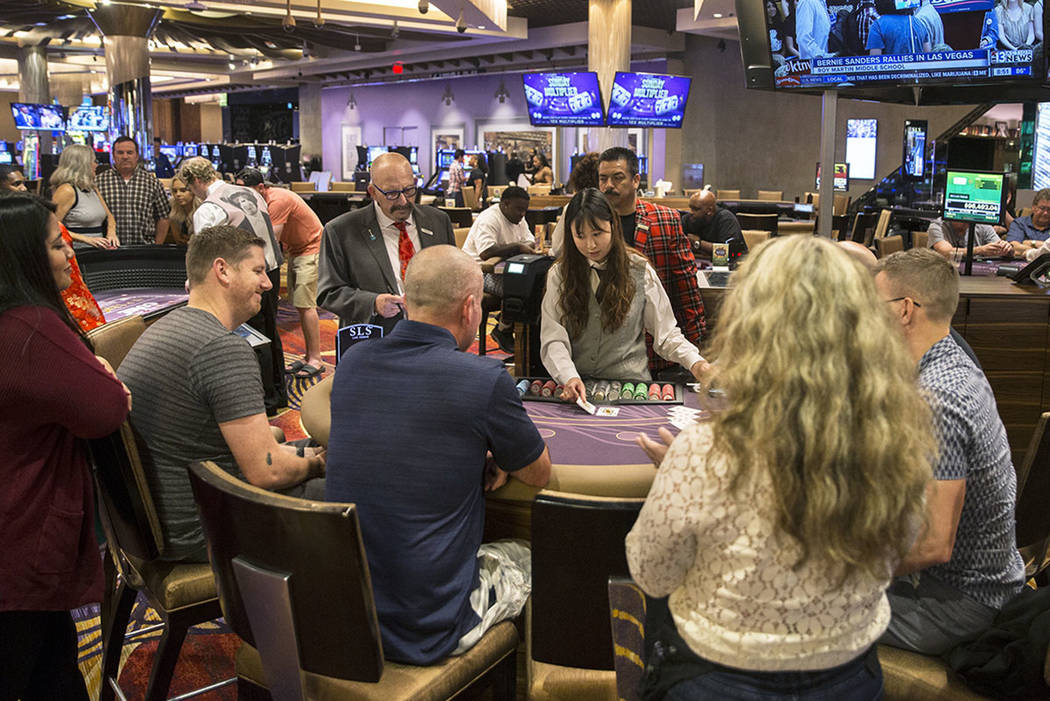Gaming tax hike plan adds tinder to Nevada’s legislative races

It’s always interesting when Silver State politics intersects with the gaming industry.
After this week’s announcement from Nevadans for Fair Gaming Taxes, a new political action committee under the auspices of the Clark County Education Association, races for the Nevada Legislature suddenly became as compelling as President Trump vs. Whoever Emerges from the Democratic Party for gaming industry watchers.
The proposal from the association would add a fourth tier to the state’s gaming tax, 9.75 percent on all monthly gross revenue of more than $250,000.
It’s clear that the initiative targets the big boys in Nevada gaming — MGM Resorts International, Caesars Entertainment, Wynn Resorts Ltd. and the other big earners within the state’s orbit.
Currently, the three-tiered tax tops out at 6.75 percent on all monthly gross revenue of more than $134,000.
Taxes for smaller establishments — which pay 3.5 percent on gross revenue of up to $50,000 per month, and 4.5 percent on gross revenue between $50,000 and $134,000 — will remain unchanged.
The third tier of 6.75 percent would apply to monthly gross revenue of between $134,000 and the new $250,000 threshold, where the new 9.75 percent tax would kick in.
If the initiative were enacted, Nevada would no longer have the nation’s lowest gaming tax. New Jersey has a 9.25 percent tax (but 17.5 percent on internet gambling), and South Dakota is at 9 percent.
Mississippi has a similar tiered system that ranges from 4 percent to 8 percent, with additional licensing fees of 3-4 percent by municipality.
The proposed increase in the gaming tax, which feeds into the state’s general fund and not directly to education, is being proposed by initiative petition. That means the organization will have until Nov. 10 to submit the 97,598 signatures required to qualify the initiative petition for verification by each of the state’s counties.
If enough signatures are verified, the measure would go to the 2021 Nevada Legislature. That is why contests for the state Senate and Assembly would enjoy added interest with candidates lining up for or against the plan.
If Democrats win a veto-proof supermajority in both state houses, the initiative would have a path to passage — all tax increases require two-thirds support. That would result in the new tax taking effect July 1, 2021.
If the Legislature fails to take action next year, the matter would appear on the November 2022 ballot and, if passed, would be enacted Jan. 1, 2023.
The Nevada Resort Association, which represents more than 70 gaming resorts in the state, came out strongly against the initiative:
“By targeting Nevada’s economic engine with a 44 percent tax increase, this proposal would be very damaging to the state’s economy, job creation, capital investment and future economic development. Let’s be very clear, the gaming industry has consistently supported a broad-based business tax to support public education and has a long history of investing in and supporting our schoolchildren. As a matter of sound and equitable policy, broad-based taxes are a more stable revenue stream than the volatility that comes with depending on a single industry.
“As Nevada’s largest industry, we generate nearly $68 billion annually for the state’s economy, pay almost 40 percent of the state’s general fund revenue and support more than 450,000 jobs statewide. Unfortunately, one of the teachers’ unions has chosen a path of higher pay at the expense of tens of thousands of other jobs throughout the state.”
There will be some interesting arguments on both sides of the debate. Why not impose a higher tax on big gaming … it hasn’t seen an increase since 2003? The rate’s too low … gaming companies pay as much as 54 percent on slot machine revenue in Pennsylvania and 53.5 percent on slot revenue in West Virginia.
But only a handful of states join Nevada in allowing unlimited licenses.
And what happens if and when we see another economic downturn? The taxation focus on one industry will torpedo revenue in a slump. And it isn’t as if the gaming industry is experiencing a robust upswing. Gaming win over the past 12 months statewide has been flat at best.
To be clear, the association is aiming high with its taxation ambition and also plans to file a petition to raise the Local School Support Tax, part of the sales tax, from 2.6 percent to 4.1 percent. Unlike the gaming tax, the sales tax hike would directly benefit schools.
Nevadans will have plenty to contemplate and debate as petitions are circulated and voters go to the polls. Suddenly, 2020 got a lot more interesting.
Contact Richard N. Velotta at rvelotta@reviewjournal.com or 702-477-3893. Follow @RickVelotta on Twitter.